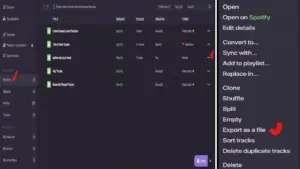

In conclusion, I recommend for backing up all playlists in a file, mostly because it's less effort than spotify-backup.py. But since spotify-backup.py is just 160 lines of open source code, it seems very unlikely that it would contain malicious code, b/c everyone can check it and report it to the GitHub administration. Note that principally downloading and running a script (or other executable program) outside the browser poses a much bigger security risk (depending on your trust in the source) than applications that run within the browser. Download MusConv - Version 4.10.


You can't copy downloaded Amazon Music Unlimited and All-Access Playlist songs onto CDs or other external storage. It is not possible to export songs for use on other apps and devices. The exported file contains all your songs, set lists MIDI presets and document metadata. Helpful Tips: Downloaded Amazon Music Unlimited and All-Access Playlist songs are only accessible within the Amazon Music app. (I stumbled over spotify-backup.py while googling. On the database you want to export from, open the database. Once selected the page will automatically load all the playlists from your Library file. Enable XML File for your Itunes Library in Itunes Settings. JSON dump of all the playlists both spotify-backup.py and SpotMyBackup without folder data, unfortunately and at least spotify-backup.py also without collaborative playlists (don't know for SpotMyBackup). A webapp that lets you convert Itunes Library.xml playlists to m3u playlists. It provides a Python script file to download and run locally. Hence we advise you to use Musify Music Downloader that can convert the songs at a time, which will save you 80 time. Is yet another Spotify playlists backup tool. If you copy the whole library folder, it will take up much more storage, since there are many extra files in the folder.


 0 kommentar(er)
0 kommentar(er)
